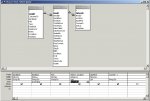sambo
Registered User.
- Local time
- Today, 09:31
- Joined
- Aug 29, 2002
- Messages
- 289
I have 3 tables in my relationship...
My relationships work like this:
1 SerialNum ("tblUnits") --> Many RmaNum ("tblRma")
1 RmaNum ("tblRma") --> Many Locations ("tblhistory")
This lets me track multiple points in history for each SerialNum (Everytime an entry is made regarding a SerialNum, there is a time stamp and a location tagged to the entry)
Simple Enough...
Now, I would like to have a query that returns 1 entry from each RmaNum, that will be the LAST entry made in "tblHistory" that correpsonds to each RMA.
So if RmaNum 1-234 has had 5 entries, I would like to return the last entry made (based on the criteria of DateModified).
I have not been able to successfuly do this.
I can get 1 entry for each RmaNum, but it is seemingly chosen at random, I would like it to be the LAST entry (not random 1 of 5).
I'll attatch a screen shot of my Query.
Thanks..
My relationships work like this:
1 SerialNum ("tblUnits") --> Many RmaNum ("tblRma")
1 RmaNum ("tblRma") --> Many Locations ("tblhistory")
This lets me track multiple points in history for each SerialNum (Everytime an entry is made regarding a SerialNum, there is a time stamp and a location tagged to the entry)
Simple Enough...
Now, I would like to have a query that returns 1 entry from each RmaNum, that will be the LAST entry made in "tblHistory" that correpsonds to each RMA.
So if RmaNum 1-234 has had 5 entries, I would like to return the last entry made (based on the criteria of DateModified).
I have not been able to successfuly do this.
I can get 1 entry for each RmaNum, but it is seemingly chosen at random, I would like it to be the LAST entry (not random 1 of 5).
I'll attatch a screen shot of my Query.
Thanks..

